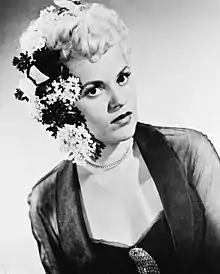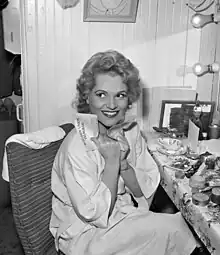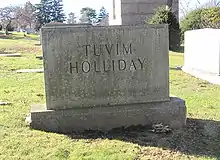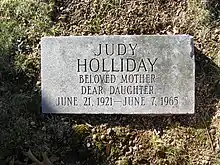Judy Holliday
Judy Holliday (born Judith Tuvim, June 21, 1921 – June 7, 1965) was an American actress, comedian and singer.[1]
Judy Holliday | |
|---|---|
 Holliday c. 1950s | |
| Born | Judith Tuvim June 21, 1921 Queens, New York City, U.S. |
| Died | June 7, 1965 (aged 43) Manhattan, New York City, U.S. |
| Resting place | Westchester Hills Cemetery |
| Occupation | Actress |
| Years active | 1938–1963 |
| Spouse | |
| Partner | Gerry Mulligan (1958–1965; her death) |
| Children | Jonathan Oppenheim |

She began her career as part of a nightclub act before working in Broadway plays and musicals. Her success as Billie Dawn in the 1946 stage production of Born Yesterday led to her being cast in the 1950 film version for which she won an Academy Award for Best Actress and a Golden Globe Award for Best Actress – Motion Picture Musical or Comedy. She was known for her performance on Broadway in the musical Bells Are Ringing, winning a Tony Award for Best Performance by a Leading Actress in a Musical and reprising her role in the 1960 film adaptation.
In 1952, Holliday was called to testify before the Senate Internal Security Subcommittee to answer claims she was associated with communism.
Early life
Holliday was born Judith Tuvim (she took her stage name from yom tovim, which is Hebrew for "holidays") in New York City, the only child of Abe and Helen (née Gollomb) Tuvim. Her father was executive director of the foundation for the Jewish National Fund of America (1951–1958),[2][3] and a political activist who ran unsuccessfully six times between 1919 and 1938 as the Socialist Party candidate for the New York state Legislature.[4] Her mother taught piano. Both were of Russian-Jewish descent.[5][6] Judith grew up in Sunnyside, Queens, New York, and graduated from Julia Richman High School in Manhattan. Her first job was as an assistant switchboard operator at the Mercury Theatre, which was administered by Orson Welles and John Houseman.[7][8]
Early career
Holliday began her show business career in 1938 as part of a nightclub act called The Revuers, whose other members were Betty Comden, Adolph Green, Alvin Hammer, John Frank and Esther Cohen.[8][9] They played engagements in New York night clubs including the Village Vanguard, Spivy's Roof, the Blue Angel, and the Rainbow Room, and the Trocadero in Hollywood, California. Leonard Bernstein, a friend of the group who shared an apartment with Green, occasionally provided piano accompaniment for their performances.[10] In 1940, The Revuers released a 78-rpm album entitled Night Life in New York.[11] The troupe filmed a scene for the 1944 Carmen Miranda movie Greenwich Village. Although the Revuers' performance was cut, Holliday was an unbilled extra in another scene. The group disbanded in early 1944.[7] Holliday remembered her years in the Revuers as unpleasant, saying she was initially a bad actress and so shy that she vomited between shows. She found it difficult to perform on stage in smoke-filled rooms while patrons over-imbibed, heckled and fought with each other, but deemed entertainers successful if they persevered in such atmospheres.[12]
In her first film role, Holliday played an airman's wife in Twentieth Century Fox’s version of the U.S. Army Air Forces' play Winged Victory (1944). She made her Broadway debut on March 20, 1945, at the Belasco Theatre in Kiss Them for Me, and was one of the recipients that year of the Clarence Derwent Award for Most Promising Female Actress.[13]
In 1946, she returned to Broadway as the scatterbrained Billie Dawn in Born Yesterday. Author Garson Kanin wrote the play for Jean Arthur; but when Arthur left New York for personal reasons, Kanin selected Holliday, two decades Arthur's junior, as her replacement.[7][10][14] When Columbia bought the rights to adapt Born Yesterday to film, studio boss Harry Cohn wouldn't consider casting the Hollywood unknown. Kanin, along with George Cukor, Spencer Tracy, and Katharine Hepburn conspired to promote Holliday by offering her a key part in the Tracy-Hepburn film Adam's Rib (1949).[15][16]
She received rave reviews for her performance in Born Yesterday on Broadway, and Cohn offered her the chance to repeat her role for the film version,[8] but only after a screen test (which at first was used only as a "benchmark against which to evaluate" other actresses being considered for the role).[17] She subsequently won the first Golden Globe Award for Best Actress – Motion Picture Musical or Comedy; and at the 23rd Academy Awards, won the Academy Award for Best Actress, defeating Gloria Swanson, nominated for Sunset Boulevard; Eleanor Parker, for Caged; and Bette Davis and Anne Baxter, both for All About Eve.[9][18]
She starred opposite newcomer Jack Lemmon in his first two feature films, the comedies It Should Happen to You and Phffft (both 1954).
Film historian Bernard Dick summed up Holliday's acting: "Perhaps the most important aspect of the Judy Holliday persona, both in variations of Billie Dawn and in her roles as housewife, is her vulnerability...her ability to shift her mood quickly from comic to serious is one of her greatest technical gifts."[19] Director George Cukor also observed that Holliday had "that depth of emotion, that unexpectedly touching emotion, that thing which would unexpectedly touch your heart."[20]
Investigated for Communist sympathies
In 1950, Holliday's name appeared on a list of 151 "pro-Communist" artists in the conservative publication Red Channels: The Report of Communist Influence in Radio and TV. The next year, she was subpoenaed by Senator Pat McCarran's Senate Internal Security Subcommittee, which was investigating subversion and Communist activity in the entertainment industry. Holliday was one of several actors accused of fundraising for Communist front organizations.[21] She appeared before the committee on March 26, 1952, with Simon H. Rifkind as her legal counsel.[22]
Holliday was advised to play dumb, as in her film portrayal of Billie Dawn, and she did – often to comedic effect.[22][23][24] She denounced Stalinism and authoritarianism generally, but defended the free speech rights of those who espoused such views.[22] Holliday later wrote of the experience to her friend Heywood Hale Broun: "Woodie, maybe you're ashamed of me, because I played Billie Dawn ... But I'm not ashamed of myself, because I didn't name names. That much I preserved."[22] The investigation "did not reveal positive evidence of any membership in the Communist Party".[22] The investigation concluded after three months and, unlike others whose careers were severely damaged by communist allegations, her career was relatively untarnished.
Later career
Holliday starred in the film version of The Solid Gold Cadillac, which was released in August 1956. In November 1956, Holliday returned to Broadway, starring in the musical Bells Are Ringing with book and lyrics by her Revuers friends, Betty Comden and Adolph Green, and directed by Jerome Robbins. In 1957, she won the Tony Award for Best Leading Actress in a Musical.[25] Of Holliday's performance in the stage musical, Brooks Atkinson wrote in The New York Times:
Nothing has happened to the shrill little moll whom the town loved in Born Yesterday. The squeaky voice, the embarrassed giggle, the brassy naivete, the dimples, the teeter-totter walk fortunately remain unimpaired ... Miss Holliday now adds a trunk-full of song-and-dance routines...Without losing any of that doll-like personality, she is now singing music by Jule Styne and dancing numbers composed by Jerome Robbins and Bob Fosse. She has gusto enough to triumph in every kind of music hall antic.[26]
Returning to her film career after a gap of several years, Holliday starred in the film version of Bells Are Ringing (1960), her last film.
In October 1960, Holliday started out-of-town tryouts on the play Laurette, based on the life of Laurette Taylor. The show was directed by José Quintero with background music by Elmer Bernstein and produced by Alan Pakula. When Holliday became ill and had to leave the show, it closed in Philadelphia without opening on Broadway.
Holliday had surgery for a throat tumor shortly after leaving the production in October 1960.[27][28] Her last role was in the stage musical Hot Spot, co-starring newcomers such as Joseph Campanella and Mary Louise Wilson, which closed after 43 performances on May 25, 1963.[29]
Personal life and death


In 1948, Holliday married clarinetist David Oppenheim, later a classical music and television producer, and academic. Oppenheim struggled with his sexual orientation; Leonard Bernstein, a mutual friend, suggested that Oppenheim marry Holliday as a beard. (In 1943, Bernstein himself wrote in a letter to Oppenheim, then in the U.S. Army, that he had thought of marrying Holliday.)[30] The couple had one child, Jonathan, before they divorced in 1957. In the late 1950s, Holliday had a long-term relationship with jazz musician Gerry Mulligan.[7][9]
Holliday supported Henry Wallace in the 1948 presidential election and Adlai Stevenson during the 1952 presidential election.[31]
In 1960, she was awarded a star on the Hollywood Walk of Fame at 6901 Hollywood Boulevard in Los Angeles.[32]
Holliday died on June 7, 1965, at Manhattan's Mount Sinai Hospital from metastatic breast cancer,[33][34] two weeks before her 44th birthday.[35] She was interred in the Westchester Hills Cemetery in Hastings-on-Hudson, New York.[8]
Filmography
Radio appearances
| Year | Program | Episode | Co Star |
|---|---|---|---|
| 1948 | Ford Theater | My Sister Eileen | Shirley Booth & Virginia Gilmore |
| 1951 | The Big Show | n/a | Fred Allen & Eddie Cantor |
| The Big Show | n/a | Fred Allen & Robert Cummings | |
| The Big Show | n/a | Tallulah Bankhead & Jack Haley | |
| The Big Show | n/a | Jimmy Durante & Carmen Miranda | |
| Hear It Now | The Human Tick | Edward R. Murrow (host) | |
| The Big Show | n/a | Groucho Marx & Bob Hope | |
| The Big Show | n/a | Tallulah Bankhead & Fred Allen | |
| 1957 | Recollections At 30 | Ladies Night | The Revuers (from 1940) |
Stage
| Year | Production | Role | Other notes |
|---|---|---|---|
| 1942 | My Dear Public | with The Revuers | |
| 1945 | Kiss Them for Me | Alice | |
| 1946 | Born Yesterday | Billie Dawn | |
| 1951 | Dream Girl | Georgina Allerton | |
| 1956 | Bells Are Ringing | Ella Peterson | Tony Award for Best Performance by a Leading Actress in a Musical |
| 1960 | Laurette | Laurette Taylor | Closed out-of-town |
| 1963 | Hot Spot | Sally Hopwinder | |
Discography
Holliday recorded two studio albums (not including her film and Broadway soundtracks) during her lifetime.
- Trouble Is a Man (1958)
- Holliday with Mulligan (DRG, 1961 [1980]) with Gerry Mulligan
References
- Obituary Variety, June 9, 1965, p. 71.
- "Abe Tuvim; Zionist Official,. Dies at 64; Executive Director of Fund Foundation" (PDF). The New York Times. 16 January 1958. Retrieved 24 December 2014.
- 1940 United States Federal Census
- "Our Campaigns - Candidate - Abraham Tuvim".
- Dash, Irene G. "Judy Holliday (1921–1965)". Jewish Women's Archive - Encyclopedia. Retrieved 24 December 2014.
- "Helen Tuvim - United States Census, 1940". FamilySearch. Retrieved 24 December 2014.
- "Judy Holiday, 42, Is Dead of Cancer", The New York Times, June 8, 1965, p. 1
- "Judy Holliday (1921–1965) Biography" Archived 2010-03-05 at the Wayback Machine, Jewish Women's Archive (jwa.org), retrieved February 21, 2010
- "Judy Holliday Biography", Turner Classic Movies (tcm.com), retrieved February 21, 2010
- Sargeant, Winthrop."Judy Holliday"Life Magazine, April 2, 1951.
- The Revuers (1940). "Night Life in New York (78rpm 12-in Set Musicraft Records #N-2)". Popsike.com. Retrieved January 30, 2022.
- Dudar, Helen. "The Post Presents the Judy Holliday Story." New York Post, 11 December 1956.
- "Kiss Them For Me Internet Broadway Database listing" ibdb.com, retrieved February 21, 2010; accessed 10 June 2014.
- "Born Yesterday Internet Broadway Database listing", ibdb.com, retrieved February 21, 2010
- Hepburn, Katharine (1991). Me: Stories of My Life. New York: Random House. pp. 246–247. ISBN 9780307807687.
- Carter, Grace May (2016). Katharine Hepburn (ebook ed.). New Word City. ISBN 9781612309613.
- Bill Crow. From Birdland to Broadway: Scenes from a Jazz Life (Oxford University Press, 1992), p. 185.
- "Top winners from 1950", Chicago Tribune, retrieved February 21, 2010; accessed June 10, 2014.
- Dick, Bernard F. Columbia Pictures: Portrait of A Studio (1992). University Press of Kentucky; ISBN 0-8131-1769-0, pp. 135–136.
- Sicherman, Barbara and Green, Carol Hurd. Notable American Women: The Modern Period (1980). Harvard University Press; ISBN 0-674-62733-4, p. 349
- Hearing Before the Committee on Un-American Activities, House of Representatives, Eighty-fourth Congress
- Barranger, Milly S. (2008). "Billie Dawn Goes to Washington: Judy Holliday". Unfriendly Witnesses: Gender, Theater, and Film in the McCarthy Era. Carbondale, Illinois: Southern Illinois University Press. pp. 9–33. ISBN 978-0809328765.
- Profile, thesmartset.com; accessed June 10, 2014.
- Duncan, Stephen R. (2014). "Judy Holliday, the Red Scare, and the (Miss-) Uses of Hollywood's Dumb Blonde Image". In D'Amor, Laura Mattoon (ed.). Smart Chicks on Screen: Representing Women's Intellect in Film and Television. Rowman & Littlefield. pp. 9–28. ISBN 978-1442237483.
- Bells Are Ringing listing, ibdb.com, retrieved February 21, 2010.
- Atkinson, Brooks. "Theater: 'Bells Are Ringing' for Judy Holliday", The New York Times, November 30, 1956, p. 18
- "Judy Holliday Faces Surgery", The New York Times, October 12, 1960, p. 44
- "Laurette: Music from the play", kritzerland.com, retrieved February 22, 2010.
- Hot Spot listing, Internet Broadway Database; retrieved February 22, 2010.
- Simeone, Nigel, ed. (2013). The Leonard Bernstein Letters. New Haven: Yale Univ. Press. p. 133. ISBN 978-0-300-17909-5.
- Motion Picture and Television Magazine, November 1952, page 33, Ideal Publishers.
- "Judy Holliday – Hollywood Walk of Fame". WalkofFame.com. Retrieved January 14, 2017.
Inducted to the Walk of Fame on February 8, 1960 with 1 star.
- Brinker, Nancy G.; Rodgers, Joni (2010). Promise Me: How a Sister's Love Launched the Global Movement to End Breast Cancer. New York: Three Rivers Press/Random House. p. 77. ISBN 978-0-307-71813-6.
- Rothaus, Steve (March 21, 2020). "The Tragic Early Death of Judy Holliday". Stories from Classic Hollywood. The Life and Times of Hollywood. Archived from the original on 28 November 2022. Retrieved 28 November 2022.
- “Judy Holliday”, biography, Turner Classic Movies (TCM). Retrieved March 3, 2018.
External links
 Media related to Judy Holliday at Wikimedia Commons
Media related to Judy Holliday at Wikimedia Commons- Judy Holliday at IMDb
- Judy Holliday at the Internet Broadway Database